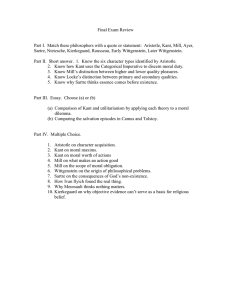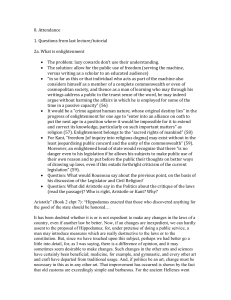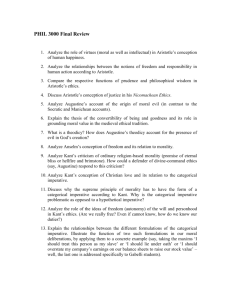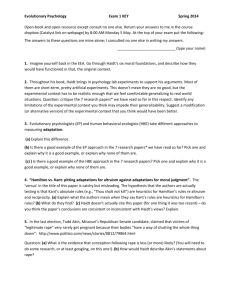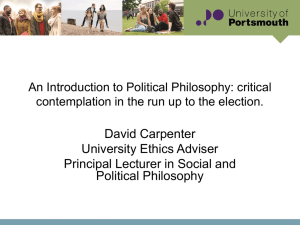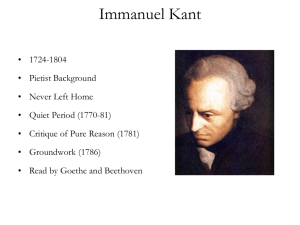Immanuel Kant
advertisement
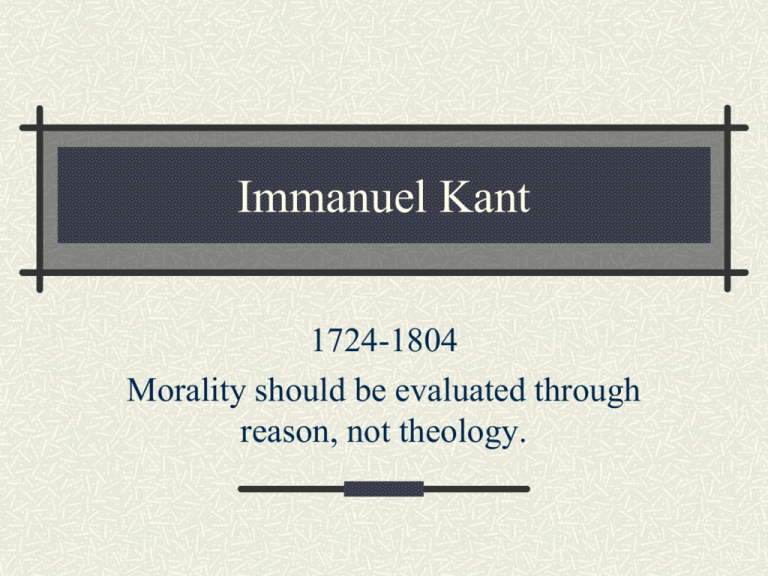
Immanuel Kant 1724-1804 Morality should be evaluated through reason, not theology. Part I. The Ethics of Duty More than any other philosopher, Kant emphasized the way in which the moral life was centered on duty. Kant’s case against Aristotle -Everyone does desire to be happy, but the purpose of life is the ability to reason, not happiness. We are called to reason because we can. That is what sets us apart—(Aristotle’s rational) -If nature intended human’s for happiness, she would not have given them reason and the ability to make choices. Free will produces more misery than all natural disasters combined! Kant’s Ethics Universal good will is the basis of all morality. Courage, intelligence, self-control are morally neutral. It took courage to blow up the world trade center and intelligence to build a nuclear bomb. If a man of bad will posses strong character traits, he will use them for evil. The test of good will for any act 1. The Universal Moral Principle: -What if everyone did this—no exception for myself 2. Do unto others as you would have done unto you: 3. One may not do evil so that good may result. -The end does not justify the means. Good will A person has good will if he/she chooses to obey moral law for the sake of moral law itself. We should be good for goodness sake-because it is the right thing to do. Morality is duty-driven People should act with integrity. Regardless of the consequences. People have intrinsic value: We may not use others as a means to an end. Moral acts Moral acts are only praiseworthy when they are done purely because they are the right thing to do, not because we will gain from them or feel inclined to do them. Things we gain from, want to do, or even are naturally inclined to do, are morally neutral. Examples A man, his wife, and the other woman. Service to others. Doing what you are inclined to do. Kant-Don’t break your arm patting yourself on the back! Good consequences do not make an action good. We do not have complete control over the consequences of our actions. So, they should not be factored in to our decision. One cannot do evil so that good may result! We must do what is right, even if we do not get warm fuzzy feelings or pleasant consequences. Exceptions Are exceptions possible for Kant? Yes, as long as they can be consistently universalized Examples The speeding car We can universalize an exception for something like ambulance drivers The Gestapo example Can we universalize a maxim to deceive in order to save innocent lives? Kant and Christianity Universal Law = Do unto others as you would have them do unto you Christian’s believe that all people have intrinsic value because they are made in the image and likeness of God. However, people often need more than reason to act in heroic sacrifice for others. Comparing Ethical Theories Ideally, we seek a society in which self-interest and regard for others converge—the green zone. Egoism at the expense of others and altruism at the expense of selfinterest both create worlds in which goodness and self-regard are mutually exclusive—the yellow zone. No one wants the red zone, which is against both self-interest and regard for others. Kant High Altruism Self-sacrificing altruism Low Egoism Not beneficial either to self or others Drug addiction Alcoholism, etc. Aristotle Self-interest and regard for others converge High Egoism Self-interest at the expense of others Low Altruism Selfish Nietzsche Types of Imperatives or duties Hypothetical Imperative: “If you want to drive to UCLA from San Diego, take the 405 freeway.” Structure: if…then… Categorical Imperative “Always tell the truth” Unconditional, applicable at all times How do we know what is Good? Two tests of goodness to see if this is a Categorical Imperative 1. Universal law: What is everyone acted this way? Am I making an exception for myself? Would I wish to live in a world where everyone acted this way? 2. People have intrinsic value: We may not use others as a means to an end.
